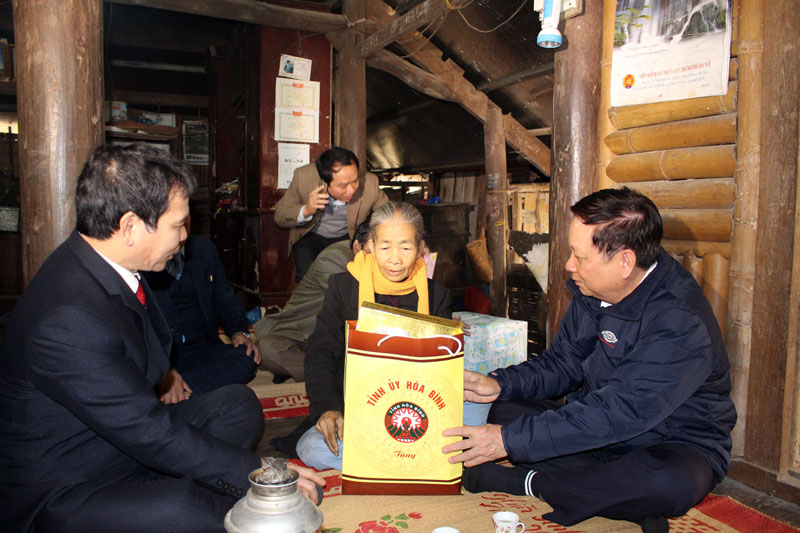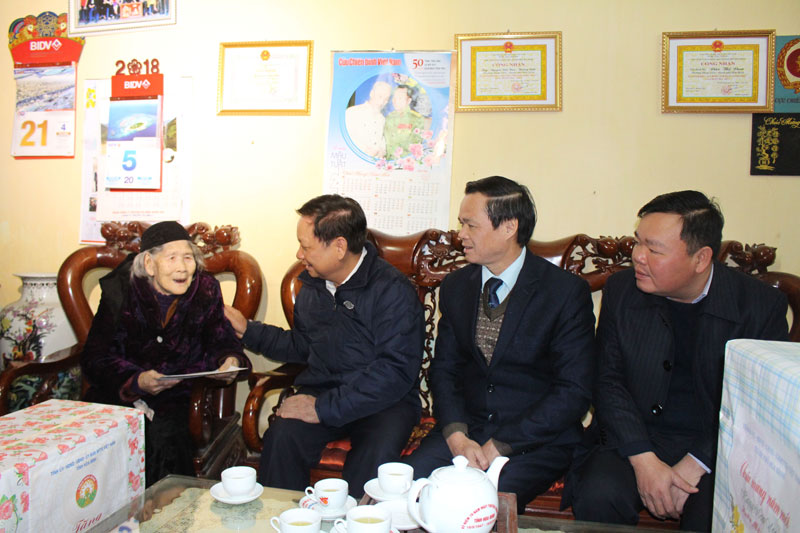
(HBO) – On the occasion of the traditional Lunar New Year 2018, a delegation from the northern province of Hoa Binh led by Secretary of the provincial Party Committee Bui Van Tinh visited senior revolutionaries, Vietnamese heroic mothers, and families of late local leaders in Kim Boi district and Hoa Binh city.
Bui Van Tinh extended his Tet greetings to families
of Bui Van Kin, late Secretary of the provincial Party Committee, in Kham
hamlet, Binh Son commune (Kim Boi district) and Nguyen Nhieu Coc, late
Secretary of the provincial Party Committee, in Cham Mat ward (Hoa Binh
city). On behalf of local authorities, Tinh presented gifts to families of the
two officials and wished them a prosperous new year.

Secretary
of the provincial Party Committee Bui Van Tinh visits family of Bui Van Kin,
late Secretary of the provincial Party Committee
Secretary
of the provincial Party Committee Bui Van Tinh visits Vietnamese heroic mother
Nguyen Thi Dan in Dong Tien ward (Hoa Binh city)
Afterwards, in Hoa Binh city, Secretary Bui Van Tinh visited Dang Huu Tin in
Phuong Lam ward, a senior revolutionary who made significant contributions to
building and developing revolutionary movements in the locality. He also
visited Vietnamese heroic mothers Nguyen Thi Dan (born in 1919) in Dong Tien
ward, and Nguyen Thi Cho (born in 1926), in Hoa Binh commune, whose children
laid down their lives in the resistance war against the US.
Secretary Bui Van Tinh handed over Tet gifts of the State President and the
province to the national contributors. He affirmed that the Party and State
always pay attention to policy beneficiary families and national revolutionary
contributors. He asked authorities at all levels to carry out more practical
activities to take better care of people who made remarkable contributions to
the cause of national building and development. He wished senior
revolutionaries and Vietnamese heroic mothers good health and hoped they will
continue educating their children about patriotism and national pride as well
as encouraging them to actively pursue learning and labour production to build
a well-off homeland./.
Hoa Binh province is undergoing a dynamic transformation amid Vietnam’s national digital transition. Building on Poliburo’s Resolution No. 57-NQ/TW on breakthroughs in science, technology, innovation, and national digital transformation, the province has rolled out a wide range of practical action plans. A standout initiative is the "Digital Literacy for All” movement, an effort to ensure that no one is left behind in the digital era.
Hoa Binh province is undergoing a dynamic transformation in the wake of the national digital transformation movement. Building on Resolution No. 57-NQ/TW of the Politburo on breakthroughs in science, technology, innovation, and national digital transformation, the province has implemented a wide range of practical action plans. A standout initiative is the "Digital Literacy for All” movement ambitious effort to ensure that no one is left behind in the digital age.
With a spirit of unity and proactive problem-solving, the Party Committee, the government and the people of Dong Lai Commune (Tan Lac District) have made great strides in implementing the resolutions of the 24th Party Congress of the commune for the 2020 - 2025 term. Focusing on leadership and practical actions, the commune has brought the Party’s resolutions into daily life, creating strong impacts and pushing the local development forward.
Amid the nationwide push for digital transformation, young people in Hoa Binh Province are stepping up as dynamic pioneers, applying technology to enhance Youth Union operations and expand the reach of youth-led initiatives. Through creativity and adaptability, Youth Union organizations at all levels have introduced a series of practical solutions, contributing to modern governance and community development.
In recent years, An Nghia commune, located in Lac Son district, has stepped up administrative reform, focusing on improving the quality and efficiency of its single-window service unit for receiving and processing administrative procedures. These improvements have helped create favourable conditions for local residents and organisations to handle administrative procedures, contributing to the commune’s broader socio-economic development.
The Prime Minister-approved master plan to develop the multi-use value of forests ecosystems through 2030, with a vision to 2050, aims to improve the management and sustainable use of forest resources, create jobs, increase incomes, and improve the living standards of ethnic minorities, people in mountainous and remote areas, forest workers and those living near forests.




